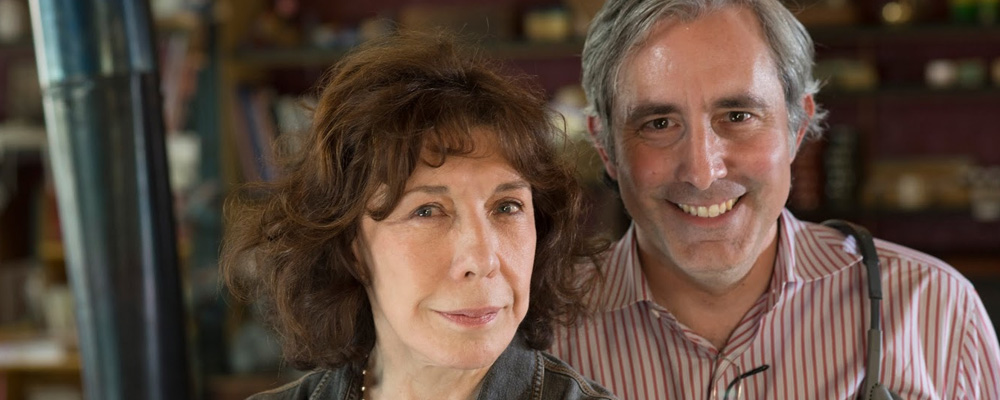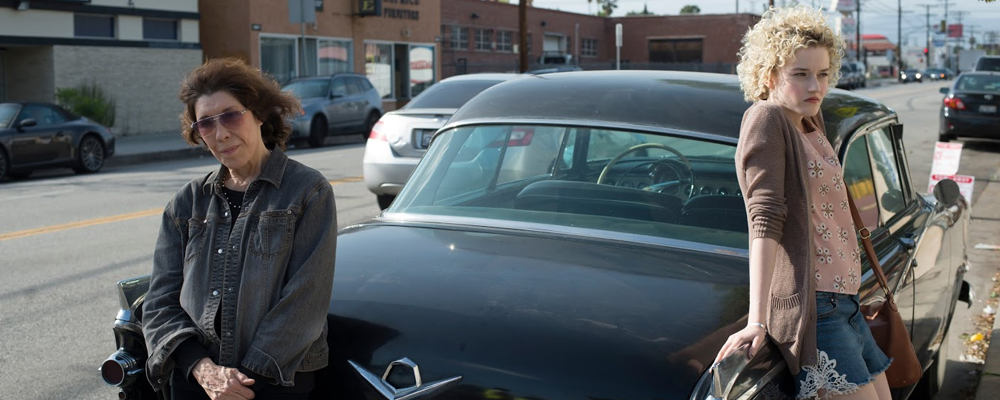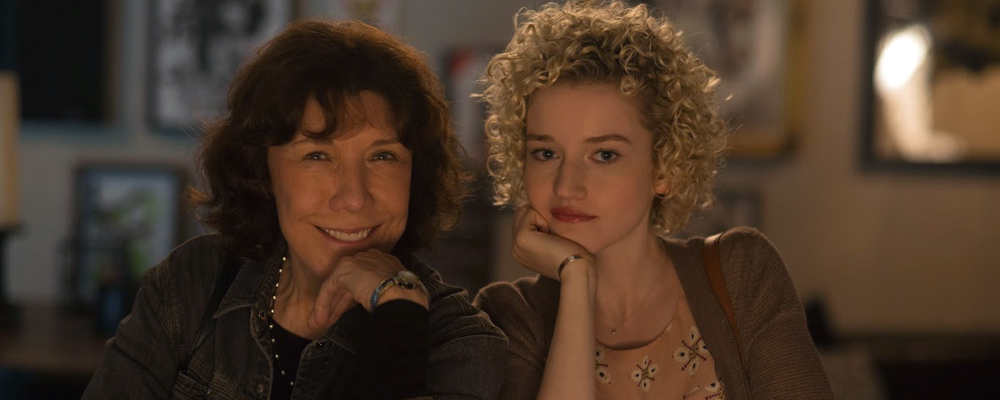‘Grandma’ Director Paul Weitz Talks Working With Lily Tomlin and His Career
Sandra Miska
Some may surprised to learn that “Grandma,” a film about a woman helping her granddaughter as she faces an abortion, was written and directed by a man, Paul Weitz who came to fame as one of the men behind the classic teen sex comedy “American Pie” that he co-directed with his brother, Chris. The brothers went on to adapt the Nick Hornby novel “About A Boy” into the film of the same name. On his own, Paul Weitz has written and directed “In Good Company,” “American Dreamz,” and “Being Flynn,” as well as directed “Little Fockers” and “Admission.” He also has experience in television, having co-created the short-lived WB sitcom “Off Centre.” He is currently working on the hit Amazon series “Mozart in the Jungle.”
Paul Weitz, who grew up in New York, is the son of novelist and fashion designer John Weitz and actress Susan Kohner. He recently sat down with Entertainment Voice to talk about “Grandma,” his career and creative process, and why “American Pie” is a bit of a feminist film.
EV: What inspired to write this film that features such strong female characters?
Paul Weitz: Partly what inspired me was hanging out with Lily [Tomlin] on the set of my film “Admission” where she played Tina Fey’s mom. She was just so funny and so perceptive, and I really wanted to spend time with her. So, I sat down and wrote this thing, and then I heard Lily’ voice as a character and it just started writing itself. I knew what the character was going to be doing at any given moment. I love this idea of a movie about someone in their seventies who is kinda edgy and more transgressive than the 18-year-old granddaughter, and the idea that it was about three generations of women. Lily’s character had seen so much and knew how hard you have to fight in life to get your due, and Julia [Garner]’s character, because she had this really strong mother, played by Marcia Gay Harden, and this really strong grandmother, had kinda no idea how to stick up for herself, and that she had so much to learn from her grandmother, and that the grandmother’s a badass. That’s why I wanted to call the movie “Grandma” from the get-go, because I liked the idea that you have these preconceived notions of what a grandma is, and that is possibly some sweet old lady, and Lily’s character is like a punk rock-type character.
EV: Do you think that Marcia’s character, who has a full-time, high-powered job, is rebelling against her mom in a way, because her mom is a writer and more of a free spirit?
Paul Weitz: I think so. If you look at it, Marcia’s character was brought up by two women in an era before it was possible for them to get married, where she probably caught some shit as kid and had to be strong from the get-go. She is somebody who, you know, in the movie Julia’s character is bummed out because her mom went to a sperm donor to have a baby, and Lily’s character decided she wanted to have a kid, and so she probably, she was very young, she probably got hammered and had a one-night stand. Neither one had a traditional route to motherhood. Marcia’s character is in reaction to her mother. Also, she was the kinda kid that Lily said, “I’ve been scared of your mom since she was five years old.” So I like this idea that she probably picked up the violin really early and was scarily focused like some kids are. And she’s the only person in the movie who can really intimidate Lily’s character.
EV: More and more films are tackling abortions, especially comedies, like “Obvious Child” and now “Grandma.” Do you feel it’s becoming less of a taboo subject?
Paul Weitz: No, I feel it’s more of a taboo subject. It was definitely not my intention to make an issue movie, partly because that’s not real. Things are turned into issues, but they’re actually humans making decisions about their lives, and sometimes the decisions are the most painful and have the most impact on the people themselves, and I hate it that women who have to make a decision about this sort of thing are dehumanized. While this is a flat-out comedy, it’s not a comedy about that. Lily’s character says stuff like, “Have you thought about this? Because it’s something that you’ll think about at some point every day for the rest of your life.” I look back at a movie like “Fast Times at Ridgemont High,” which was the birth of Spicoli and Sean Penn, but actually Jennifer Jason Leigh’s character in the beginning of the movie gets an abortion. We don’t look back at that and say, “Wow, that was a really edgy issue movie.” …No, I think it’s become more taboo, frankly.
EV: What’s your writing process like? Do you write every day?
Paul Weitz: When I’m on something, it’s really fun. When I’m first working on something, in this case, usually I got to a café because for some reason I feel weird writing in a really pleasant room [laughs]. I have a really nice office, but I can’t write there. I feel so self-conscious. I like being somewhere where I can get caffeine and where there’s other people around, maybe writing their own stuff or something. Somehow that makes me feel less judgmental about myself. I work on something in the back of my head usually for a really long time before I sit down and write.
EV: How long did it take you to write “Grandma”?
Paul Weitz: I probably thought about it for three or four years and it changed a lot. I don’t even think that the main character was necessarily even a woman, initially.
EV: That’s interesting.
Paul Weitz: When I wrote it, it was pretty clear. [It took] like three weeks or something. And then I kept on working on it with Lily. But that’s a mirage, because I had really been thinking about the plot for so long before I sat with Lily to make sure that every beat made sense to her. The most important audience to me was Lily; I wanted to make sure that there was nothing in there that she thought was fake or callous. I knew how smart she was, and I knew that was my biggest asset here.
EV: In the past you’ve made films with your brother. How does directing on your own compare to that experience?
Paul Weitz: It’s been a while since I directed with my brother. He grew up in England, and it is an English thing, I feel, which is your never supposed to appear sweaty. When we were directing together, I felt like we fell into these roles where I was really the overly emotional one, and he was the cool, calm, cerebral one which was complete hogwash. I’m just happy that we were able to do it, and maybe we will direct something together again someday. I was happy we were able to do stuff on our own. Most people aren’t able to do that. But the main thing was that it actually was good for our friendship and that we were able to separate. We are always there for each other; we watch each other’s cuts and give opinions. He’s one of my first people I turn to. We still have a company together, so it’s all good. I feel like our parents did a good job [laughs]. That could’ve been scary and it could’ve led to conflict, the fact we directed a bunch of films together and now we’re doing stuff on our own.
EV: Do you think your parents’ involvement in the entertainment business led to you making the decision to choose the field that you did?
Paul Weitz: I’m always amazed at people who have zero exposure to entertainment who become great filmmakers or actors. It blows my mind. My hat’s off to them. I think that, the thing was, my dad was a fashion designer, but he wrote novels and non-fiction books. I remember seeing him late at night writing, not because it was going to help him or make him money, but just because he felt that it was something that he needed to do. That really stuck in my head. My mom was an actress, and is also a very unsentimental critic of my work. If I want the straight dope on a script I’ve written I’ll give it to my mom. I just sent her a script; she read it and said, “I think your main character is less interesting than your supporting character. You’re in trouble here; you better do another draft of this.”
EV: That’s good feedback.
Paul Weitz: It really is. It’s pragmatic stuff like that, as opposed to some, you know, oh, I have some birthright. I never felt any of that, frankly. Actually I felt like it were those grander than I who had the right to make films.
EV: You’ve been involved in a lot of great comedies. You co-directed “American Pie” that is one of my favorite films, and you did the sitcom “Off Centre,” which I thought was really great. Would you ever do another raunchy comedy?
Paul Weitz: I don’t know if I would ever do another one like that because I felt that “American Pie” was about as good as we could do raunch level. Weirdly, while that was looked at, no doubt accurately, as a fairly male-driven film, we actually made that film so it would be – We were consciously trying to have it be more aimed at women and girls than something like “Porky’s.” If you look at it, the women pretty much always end up in positions of empowerment in the movie. Jason Biggs is spying on Shannon Elizabeth, but [she ends up making him] whip his ass and stuff [laughs]. Nah, I don’t think I can really go back to the train, but I will say, it was kinda weird for me, when I saw this movie “Grandma” play at Sundance and at various places since then, to feel like some of the laughs were similar to “American Pie”-type stuff; being in a big audience it was functioning as a comedy.
EV: And John Cho’s in both.
Paul Weitz: Yeah, he’s like our good-luck angel. His work in “Off Centre” was really fantastic. I like to use people repeated times.
EV: What was your favorite scene in “Grandma”?
Paul Weitz: I don’t know if I have one. Actually, honestly, there’s a scene with Lily and Marcia Gay Harden where there’s a long take and they’re just sitting together and they’re dealing with some of this granddaughter and this trouble she’s gotten herself into. And Marcia says, “Kids,” and I didn’t cut. I felt like there was so much going on, and I felt like it was such an intimate moment between the two actresses. With this film, I was often in the position to feel excited that I was the first audience for what the actors were doing. And, then, obviously I’m super excited about the stuff with Sam [Elliot]. Pretty much everything in this movie was the best version of what I could’ve hoped for.
EV: Was there a scene that was more challenging to film than others?
Paul Weitz: The first scene, which is the break-up scene. We shot that first. I feel like the first time I step on the set of any movie I’m doing, the first day I need to remember how the hell to direct. I don’t why that is [laughs]… I think it’s actually partly because I’m so excited that I can’t sleep the night before, so I’m tired the first day, but then I get my shit together and do it properly. That was a break-up scene and it was a scene in which Lily was being really harsh to Judy Greer. It was kinda hard to triangulate with the rest of the movie, and afterward Lily was saying, “I hope I was mean enough for that.” And I felt like she was, I felt like I had what I needed for that scene. That was the hardest thing to shoot.
EV: What’s next for you?
Paul Weitz: I’m working on this show called “Mozart in the Jungle” on Amazon, which I run with Jason Schwartzman and Roman Coppola. It’s set in the classical music world, and it’s really exciting, because a couple of weeks ago I got to go and film at the Hollywood Bowl. Gustavo Dudamel had seen the show, and Gael[Garciá Bernal]’s character, you know, some people feel like maybe his character [was inspired by] Gustavo. Anyway, Gustavo heard about it and he let Gael conduct in from of 12,000 people the four and a half minute overture of “The Marriage of Figaro.” So, I got to film that and I got to work with Gustavo as an actor. Gustavo plays this stage manager who complains to Gael’s character that the orchestra hates their conductor and he should come take over. That’s really nice to me, learning stuff about the classical music world. I’m working on an adaptation [of a novel] and a couple of other things.
“Grandma opens in Los Angeles Aug. 21



